Kris Spisak's Blog, page 11
October 8, 2019
Writing Tip 391: “Manila” vs. “Vanilla” Folders

 I find it fascinating when typos are so common that online stores consider them and can redirect these mistakes to what you actually need. Maybe home improvement stores do this with spigots already when someone searches for a “spicket,” but what’s gotten my attention lately is the mistake of “manila” vs. “vanilla” folders.
I find it fascinating when typos are so common that online stores consider them and can redirect these mistakes to what you actually need. Maybe home improvement stores do this with spigots already when someone searches for a “spicket,” but what’s gotten my attention lately is the mistake of “manila” vs. “vanilla” folders.
Do you know what they are actually called?
Before you embarrass yourself in front of your boss, please remember that the correct word is “manila.”
They have nothing to do with anything vanilla in taste or color. (I’m guessing you already knew that about any potential taste, but I’m just covering all the bases here.)
Here’s the story:
Manila folders were introduced to the world in the late 1800s. They gained their name from the material that they were originally made out of, manila hemp. This specific type of hemp comes from a species of plantain-like fruit called abacá, which grows largely in the Philippines, and, of course, you know that Manila is the capitol of the Philippines. Manila hemp was a popular material in paper making, its yellowish-brown fibers strong yet thin, perfect for folders and envelopes.
Of course, manila folders are not still made of manila hemp; however, they are most commonly colored to mimic the original shade of yellowish brown. It’s funny how people get used to things and want to keep them familiar, isn’t it?
The “vanilla envelope” confusion seems to go back to the 1980s, or at least that’s when there’s a written record of it jumping into popular use.
Typos persist, but don’t depend on someone else (or ecommerce website redirects) to fix this problem for you. At work, at school, or organizing your home file cabinet, go ahead and use the supplies that make things easier. Manila envelopes are sturdy and multi-purpose. But they are in no way connected with vanilla.
Please don’t plop your vanilla ice cream on your folders to make this better. No vanilla bean essential oil needs to be a part of this. It’s a simple swap–not “vanilla” but “manila.” I have faith you can get this right.
Is this pushing the envelope? Nope, but it is time to get this word right.
Join 800+ subscribers and sign-up for my writing and editing email newsletter for more tips like this.
The post Writing Tip 391: “Manila” vs. “Vanilla” Folders appeared first on Kris Spisak.
October 4, 2019
S3: E4 – The Origin of “Silhouette” & How Do You Spell “Piecemeal” (“Peacemeal”? “Piecemail”?) Anyway?
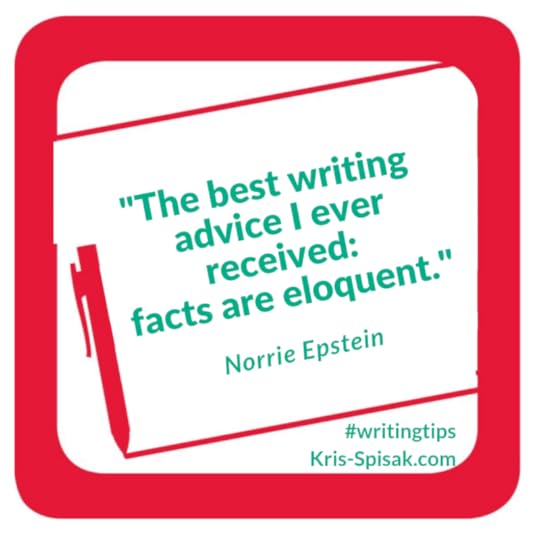
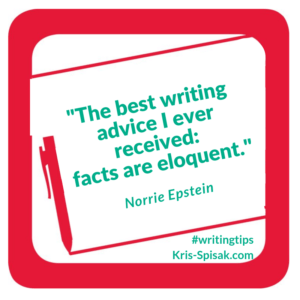
A few stolen minutes out of your day to talk words and communication, because Ben Franklin and Kurt Cobain both influenced our modern English language and spelling memes deserve to be debunked. Words. Language. Human communication. Everything begins there.
Norrie Epstein once said, “The best writing advice I ever received: facts are eloquent.” Oh how much I love this statement. It’s true in conversations, in books, in journalism, and anywhere words might take you. Sometimes, these facts are world changing. Sometimes, these facts are word-changing—or, at least in how you perceive certain uses of language.
Are you ready to dive in? I have two big questions for you today.
Season 3, Episode 4: The Origin of “Silhouette” & How Do You Spell “Piecemeal” (“Peacemeal”? “Piecemail”?) Anyway?
Approximate transcript:
If you’re doing something “piecemeal,” how do you spell that? And how did a silhouette portrait—a black shadow of a profile rather than a standard painted portrait—gain its name?
This is Episode 4 of Season 3 of the Words You Should Know podcast. There’s so much you should know, really. And here we go.

If you have a full dandelion, can you make its wishes in piecemeal? I’m guessing not, but who knows how wishes work?
If a “happy meal” once made you excited as a kid, would a “peace meal” make you excited as a grown up? “Happy” is good, but “peace” is a larger group undertaking. I know it’s not that simple, but I like the idea of a “peace meal,” even if this isn’t the actual spelling of the word.
What are we actually talking about?
To do something bit by bit. To do it in pieces. First things first, the beginning of this word is “piece” not “peace.” Got it? Good. But what about the rest of it?
Piecemeal? Piecemail? Piece-what?
I know “meal” doesn’t seem logical here—there’s nothing involving food to mention, no calories and nothing Instagram-worthy—but that is the correct spelling of this word: “P-I-E-C-E-M-E-A-L.”
The truth of it is that “piecemeal” is simply a really old word, dating back to roughly 1300, and this “meal” ending that was once completely logical has transformed into something bemusing, something befuddling. But here’s what you should know.
“Piecemeal” comes from the word “piece,” as we understand it today (isn’t it awesome when there’s a not tricky part?), combined with the suffix or word ending “-meal.” But, again, let’s think past food. This old “meal” was used around the concept of measurement. For example, a “footmeal”—or fotmælum in Old English—was not a time to sit and dine on feet, it was talking about the length of a foot. Moreover, it was more than a measurement. It was understood as “foot by foot,” or a little bit at a time. Footmeal. Thus, “piecemeal” could be understood not just as a small measurement but also “piece by piece,” which would hold the same meaning for us today.
We should also add into this conversation the old word “fingermeal,” which is not a meal to be eaten with one’s fingers, but that same old use of “meal” as a measurement, as in the length of a finger.
Footmeal. Fingermeal. Piecemeal. It’s all coming together now, isn’t it?
Hopefully. At least you’ll get the spelling right, and please remember “piecemeal” is a single word. No hyphen is necessary.
We’re not talking world peace within this word. I’ve even heard interesting arguments about how maybe it’s “piecemail” related to the chainmail (also spelled “chainmaille”) a knight might have worn in the Middle Ages (the little links joining up piece by piece to make the whole). To this, I say, cool idea and very creative, but just because you can make up a story, that doesn’t mean it’s true.
Wait a moment, I’m sensing a moral here. You know I love storytellers, but there’s a time and a place for such creativity. Spreading #fakenews about etymology stories … that’s just going too far.
Do you have any word origin stories you always believed were true but then they actually weren’t? I feel you. But now is the time to get things right—to write things right—to right the wrongs by writing them right.
Too much?
And speaking of origin stories, here’s one more for today.
Think of the word silhouette. What does this evoke for you? Do you have one hanging on your wall at home? Do you have one in your attic? Do you have any idea what I’m talking about?


Think of an image in a single color, usually depicting a person’s profile. Most commonly, it’s black on a white background. Are we on the same page? Okay. So why on earth is this called a “silhouette”?
It’s not quite another boycott story, with a word forever pointing to a man’s shame, but it’s not that far off really.
There was once a French finance minister, Etienne de Silhouette, who imposed strict economic restrictions during the Seven Years War (1756 – 1763). The upper classes especially didn’t appreciate the restrictions, and the name “silhouette” began to be used as a synonym for something done cheaply—not necessarily “piecemeal,” but cheaply.
When profile portraits began to be popularized—largely because these black profiles were significantly less expensive than a formal painted portrait—they became known as “silhouettes,” and the name stuck.
When we imagine silhouettes today, we don’t immediately think “cheap,” so that’s a positive for Etienne de Silhouette. However, in his day, his name was not a popular one.
The origin of “silhouette.” True story.
Facts are eloquent. What are you going to do with the truth today? How are you going to communicate it and communicate it well? Big truths. Little truths. Any truths.
I mean, I’m still holding out for that “peace meal” to complement a “happy meal.” But in the meantime, let’s work on using our words well. Perhaps today, it starts with spelling “piecemeal” correctly. Tomorrow, who knows?
Join 800+ subscribers and sign-up for my English language tips and trivia email newsletter for more articles and podcasts like this.
If you like what you’ve been hearing, don’t forget to subscribe to this podcast (via Apple Podcasts, Android, Google Podcasts, Stitcher, or RSS) so you’ll never miss out on another word you should know. Many thanks to those of you who have taken the time to rate my show on iTunes or wherever you listen.
And if you’re looking for an Elements of Style for the Twitter Generation, check out my book, Get a Grip On Your Grammar: 250 Writing and Editing Reminders for the Curious or Confused. Newbery-winning author Meg Medina says, “You should keep a copy on your desk.” Sounds like good advice to me!
Words. Language. Communications. You’ve got this.
The post S3: E4 – The Origin of “Silhouette” & How Do You Spell “Piecemeal” (“Peacemeal”? “Piecemail”?) Anyway? appeared first on Kris Spisak.
October 2, 2019
Writing Tip 390: “Piecemeal” vs. “Piecemail” vs. “Peacemeal”


If you have a full dandelion, can you make its wishes in piecemeal? I’m guessing not, but who knows how wishes work?
If a “happy meal” once made you excited as a kid, would a “peace meal” make you excited as a grown up? “Happy” is good, but “peace” is a larger group undertaking. I know it’s not that simple, but I like the idea of a “peace meal,” even if this isn’t the actual spelling of the word.
What are we actually talking about?
To do something bit by bit. To do it in pieces. First things first, the beginning of this word is “piece” not “peace.” Got it? Good. But what about the rest of it?
Piecemeal? Piecemail? Piece-what?
I know “meal” doesn’t seem logical here—there’s nothing involving food to mention, no calories and nothing Instagram-worthy—but that is the correct spelling of this word: “P-I-E-C-E-M-E-A-L.”
The truth of it is that “piecemeal” is simply a really old word, dating back to roughly 1300, and this “meal” ending that was once completely logical has transformed into something bemusing, something befuddling. But here’s what you should know.
“Piecemeal” comes from the word “piece,” as we understand it today (isn’t it awesome when there’s a not tricky part?), combined with the suffix or word ending “-meal.” But, again, let’s think past food. This old “meal” was used around the concept of measurement. For example, a “footmeal”—or fotmælum in Old English—was not a time to sit and dine on feet, it was talking about the length of a foot. Moreover, it was more than a measurement. It was understood as “foot by foot,” or a little bit at a time. Footmeal. Thus, “piecemeal” could be understood not just as a small measurement but also “piece by piece,” which would hold the same meaning for us today.
We should also add into this conversation the old word “fingermeal,” which is not a meal to be eaten with one’s fingers, but that same old use of “meal” as a measurement, as in the length of a finger.
Footmeal. Fingermeal. Piecemeal. It’s all coming together now, isn’t it?
Hopefully. At least you’ll get the spelling right, and please remember “piecemeal” is a single word. No hyphen is necessary.
We’re not talking world peace within this word. I’ve even heard interesting arguments about how maybe it’s “piecemail” related to the chainmail (also spelled “chainmaille”) a knight might have worn in the Middle Ages (the little links joining up piece by piece to make the whole). To this, I say, cool idea and very creative, but just because you can make up a story, that doesn’t mean it’s true.
Wait a moment, I’m sensing a moral here. You know I love storytellers, but there’s a time and a place for such creativity. Spreading #fakenews about etymology stories … that’s just going too far.
Do you have any word origin stories you always believed were true but then they actually weren’t? I feel you. But now is the time to get things right—to write things right—to right the wrongs by writing them right.
Too much?
The post Writing Tip 390: “Piecemeal” vs. “Piecemail” vs. “Peacemeal” appeared first on Kris Spisak.
September 20, 2019
S3: E3 – The origin of “compete” and “boycott” & is “lineup” / “line up” one or two words anyway?
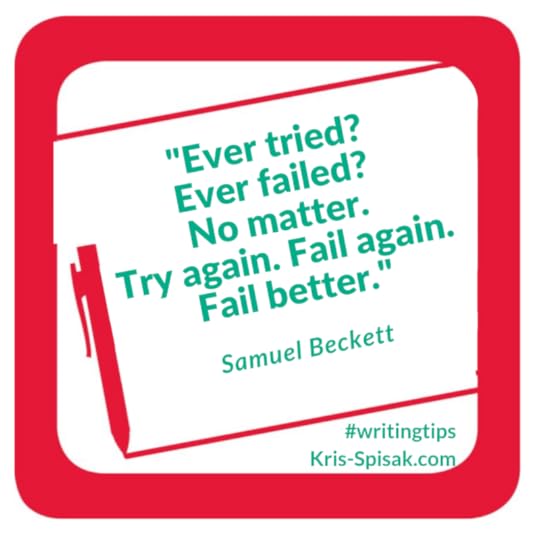
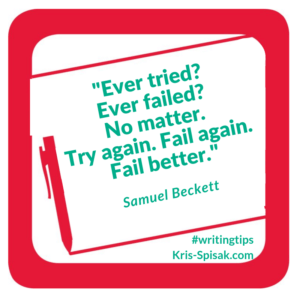
A few stolen minutes out of your day to talk words and communication. Let’s talk language tips for the curious or confused. Welcome to episode three of season three.
The Irish author Samuel Beckett once wrote, “Ever tried? Ever failed? No matter. Try again. Fail again. Fail better.” I love this idea, in talking about communication skills as well as so many other areas of life.
People can be so scared of failure or doing something incorrectly. I’ve been thinking a lot about this lately. But what can we achieve if we don’t try?
Season 3, Episode 3: The origin of “compete” and “boycott” & is “lineup” / “line up” one or two words anyway?
Approximate transcript:
Tied into this idea, today’s question for you is what’s the Latin origin of the word “compete”? Is it to be the best? Is to work hard? Is it to strive together? Is it the physical collision of two bodies? Only one of those is correct. Think on that.
And while we’re thinking about competition, consider the word (or should I say words?) “lineup” / “line up.” Kindergartners line up with their classmates. A football team’s lineup is set before the game begins (and hopefully if you’re playing fantasy football, yours is too). It’s one of those words that baffles and people tend to have their thumbs hovering over that space bar, quivering, nervous about that space or no space, or hyphen! Yes, that’s it, hyphen! No, wait, it’s just one word… I get it. It’s the little things that are sometimes never explained. We’ll dive into that one to.
But before I get to that answer, let’s talk about another word origin story. Since we’re talking about competitions and lineups today, let’s also turn to the fascinating background of the word boycott. Have you ever boycotted something? Do you know where this word came from?
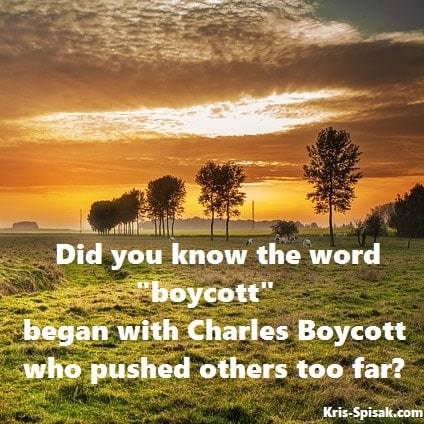
In the fall of 1880, the Irish Land League was working to help tenant farmers better their conditions during the Irish Land War. Here’s where the Englishman, Captain Charles Boycott, enters the scene. He was one of many land agents in this time who was targeted by a non-violent strategy of public ostracism. Not only did his laborers leave his fields, but reportedly, shops would not sell to him, nor would his mail be delivered.
All of his supplies had to be shipped from England, because no Irishman would deal with him.
Only a few months after the boycotting of Boycott, his name was first used as a verb, to “boycott” something, as in to no longer do business with, buy from, or spend time with. And the rest is history.
This season of the Words You Should Know podcast, we’re going to explore a number of people whose names became entries in the dictionary, whether they appreciated it or not. I’m guessing Charles Boycott didn’t appreciate it. But we’ll see how other folks in our lineup might have felt.
And there’s that word again “lineup.”

Should I say, “how do you like them apples” in this lineup?
Think fast, should it be one or two words? Or should it be hyphenated?
“Line up” or “lineup” or “line-up”? It’s one of those language questions that can have you staring at the blinking cursor on your screen. Hopefully, this quandary isn’t one that crosses the line of something that has you blinking and cursing at your screen.
But when I ask, “which version is correct,” it’s admittedly a bit of a trick question. It can be one word or two, depending on your goals with it.
Is it a verb, where you are lining something up? Children, pencils, chess pieces? If you’re saying, “line up, everyone,” or realizing it’s time to line up your nesting dolls—one next to its smaller sister, next to its smaller sister, next to its smaller sister—it’s two words.
Is it a noun, where you’re referring to the group? Your fantasy football team lineup or the lineup for tonight’s performance? If so, it is one word, no space, no hyphen. I know you want that hyphen, but it’s really not necessary.
But what about that hyphen? You never actually need it. Sure, maybe you could get away with it when you’re using it as an adjective, as in the coaches’ “line-up” decisions, but notice my wording here. “Maybe, you could get away with it.” The recommended version, even when acting as an adjective, is the one word form.
So in short, lineup (one word) is a noun or adjective. Line up (two words) is a verb.
That’s not too tricky, right? “Pick up” / “Pickup” and “Set up” / “Setup” work the same way.
The one-word form is a noun or adjective. The two-word form is a verb.
There’s not any English language grammar offenders lineup, where you’re going to be called out by folks wielding red pens poised for the attack. You know I’m here to take down the idea of grammar police, not because they don’t have things to teach us, but because it’s not the attitude we need right now. Let’s embrace helping each other and trying to be better versions of ourselves. In life—as in grammar—this is how we change the world.
Maybe today, our efforts are as simple as striking a hyphen, but who knows what’s next?
I’m looking forward to the lineup of podcasts coming your way this season. We are, as you’ve noticed, going back to new shows released every week. And yes, if you’re curious, when I say our Words You Should Know lineup for season three of this English language audio show, that’s “lineup”—one word. No space. No hyphen. But I have faith that you knew that.
As for my first question of this show, before lineups and boycotts, it was all about the word “competition.” We can get competitive over a lot of things. Competition can be fun; it can be intense, but what’s the origin of that word?
Is the Latin root of “competition” to be the best? To work hard? To strive together? Or the physical collision of two bodies?
If you answered “to strive together,” you got this one right. So, grammar’s not a competition. There’s no lineup to worry about. But if you’re thinking about all of us striving together to be the best English language communicators we can be, okay, I’ll absolutely agree to that.
Join 800+ subscribers and sign-up for my English language tips and trivia email newsletter for more articles and podcasts like this.
If you like what you’ve been hearing, don’t forget to subscribe to this podcast (via Apple Podcasts, Android, Google Podcasts, Stitcher, or RSS) so you’ll never miss out on another word you should know. Many thanks to those of you who have taken the time to rate my show on iTunes or wherever you listen.
And if you’re looking for an Elements of Style for the Twitter Generation, check out my book, Get a Grip On Your Grammar: 250 Writing and Editing Reminders for the Curious or Confused. Newbery-winning author Meg Medina says, “You should keep a copy on your desk.” Sounds like good advice to me!
Words. Language. Communications. You’ve got this.
The post S3: E3 – The origin of “compete” and “boycott” & is “lineup” / “line up” one or two words anyway? appeared first on Kris Spisak.
Writing Tip 389: “Line up” vs. “Lineup” vs. “Line-up”


Should I say, “how do you like them apples” in this lineup?
Think fast, should it be one or two words? Or should it be hyphenated?
“Line up” or “lineup” or “line-up”? It’s one of those language questions that can have you staring at the blinking cursor on your screen. Hopefully, this quandary isn’t one that crosses the line of something that has you blinking and cursing at your screen.
But when I ask, “which version is correct,” it’s admittedly a bit of a trick question. It can be one word or two, depending on your goals with it.
Is it a verb, where you are lining something up? Children, pencils, chess pieces? If you’re saying, “line up, everyone,” or realizing it’s time to line up your nesting dolls—one next to its smaller sister, next to its smaller sister, next to its smaller sister—it’s two words.
Is it a noun, where you’re referring to the group? Your fantasy football team lineup or the lineup for tonight’s performance? If so, it is one word, no space, no hyphen. I know you want that hyphen, but it’s really not necessary.
But what about that hyphen? You never actually need it. Sure, maybe you could get away with it when you’re using it as an adjective, as in the coaches’ “line-up” decisions, but notice my wording here. “Maybe, you could get away with it.” The recommended version, even when acting as an adjective, is the one word form.
So in short, lineup (one word) is a noun or adjective. Line up (two words) is a verb.
That’s not too tricky, right? “Pick up” / “Pickup” and “Set up” / “Setup” work the same way.
The one-word form is a noun or adjective. The two-word form is a verb.
There’s not any English language grammar offenders lineup, where you’re going to be called out by folks wielding red pens poised for the attack. You know I’m here to take down the idea of grammar police, not because they don’t have things to teach us, but because it’s not the attitude we need right now. Let’s embrace helping each other and trying to be better versions of ourselves. In life—as in grammar—this is how we change the world.
Maybe today, our efforts are as simple as striking a hyphen, but who knows what’s next?
The post Writing Tip 389: “Line up” vs. “Lineup” vs. “Line-up” appeared first on Kris Spisak.
September 13, 2019
S3: E2 – “Bragging rights” (or “rites”)? “Rites (or “rights”) of passage”? And what’s the story about “braggadocio”?
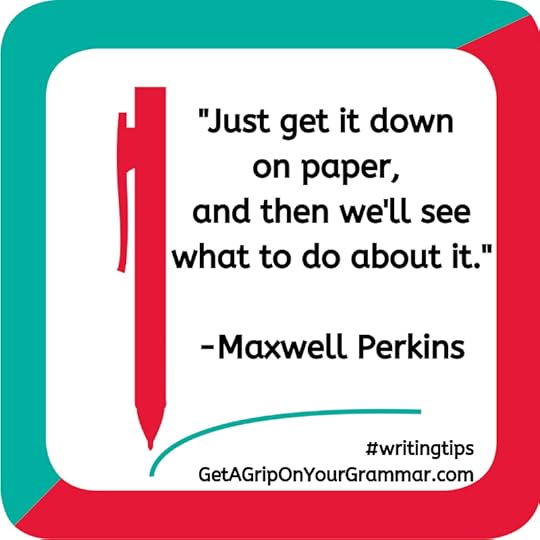
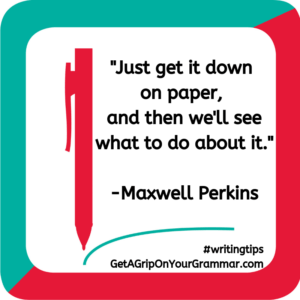
No matter how you’re using your words, in emails or essays, poetry or presentations, you’ve got to start somewhere. Maxwell Perkins, the book editor best known for the writers he discovered including Ernest Hemingway, Thomas Wolfe, and F. Scott Fitzgerald, once said, “Just get it down on paper, and then we’ll see what to do about it.”
No matter what you’re writing or planning to say, it’s true, isn’t it? Just get it down. Just spit it out. Nothing can be carved into a masterpiece if you don’t even have the lump of clay to work with.
Being an English language and grammar pro isn’t a matter of what degrees you’ve earned or what witty pun you might have on your coffee mug. Oh, yes, I’m talking to you with your, “The past, the present, and the future walked into a bar. It was tense” mug. Sure, I love it. Looking to comfort a word-lover? “There, their, they’re.” (Okay, that one makes much more sense if you could see the different spellings).
But witty mug in hand or not, let’s keep working on our words, and let’s keep amusing ourselves and discovering their fascinating roots along the way.
Season 3, Episode 2: “Bragging rights” (or “rites”)? “Rites (or “rights”) of passage”? And what’s the story about “braggadocio”?
Approximate transcript:
Are grammar skills a rite/right of passage? Perhaps. Should you have bragging rights/rites about it? You’re better than that, aren’t you folks? My biggest question here though is how do you spell those “rights” and “rites”? “Rite” or “right” of passage? Bragging “rights” or “rites”? You think on that, and I’ll come back to it.
First, let’s get a bit language nostalgic and take a walk down word memory lane.
I recently stumbled on an amazing resource from the American Dialect Society that recorded most popular words of the year—words and phrases that filled American pop culture, words most likely to succeed, words that were the most unnecessary, and more—for every year between 1990 and 2018.
Some of the highlights I have to share.
In 1991, the word (or should I say set-up phrase?) of the year was “mother of all.” As in the mother of all writing tips, which I just said in last week’s “Mother Load/Lode” podcast. That gave me a smile. Though, then again, 1991’s most rapidly growing phrase was “in your face,” so there’s that.
1997’s Word of the Year was “millennium bug,” also known as “the Y2K bug.”
1998’s Word of the Year wasn’t a word or a phrase but a prefix, specifically “e-“ for adding “electronic” onto existing words like “e-mail” and “e-commerce.” Wild stuff. And of course, we’ve dropped the hyphen in those words over time.
2000’s Word of the Year was “chad,” but before you start getting heated over politics, let me cheer you up with the same year’s “Most Likely to Succeed Word”: “muggle.”
2005’s Word of the Year was “truthiness,” credited to Stephen Colbert on The Colbert Report. Interesting. Relevant. And also relevant from the same year was the new and useful word “podcast,” an audio recording like what you’re listening to right now, which gained its name from the merging of “broadcast” and Apple’s “ipod.” Did you ever put that one together? It’s true.
2006’s Word of the Year was a verb of the year “to be plutoed,” as in to be demoted or devalued. Aw, poor Pluto.
I know I could go on here. I kind of want to, but I won’t. Links to the full list are in my show notes.
All right, so let’s circle back to those questions: “Bragging rights” or “bragging rites”? “Rites of Passage” or “rights of passage”? Do you have your answers?

Should you take a right? Or is the journey itself a rite? I could write an entire story about the muddle of these words—right, rite, write?—but I’ll stop here.
Discussions of “Rights” are sometimes tricky. Discussions of “Rites” are often equally complicated. Discussions of why I capitalized both of those words might be intimidating. But discussing the differences between “rights” and “rites” shouldn’t be a matter that mystifies us.
Remember:
“Right” can mean correct; it can mean the opposite of left. It can also mean what is just, fair, and proper, or the embodiment of something that you can claim as your due.
“Rite” is often (but not always) used in a religious sense, as a ceremonial act or initiation that one goes through.
Once these definitions are sorted out, we can tackle the question of a “Right” or “Rite” of Passage.
A “Rite of Passage” is a moment or ritual that acts as a crossover to a new stage of life. A religious confirmation is a rite of passage, as is marriage, as is a middle school grilling in grammarian jargon that may or may not shape your excitement about the English language. This is a phrase that was first used in 1909, but I’m guessing it wasn’t because of that last example. Let’s all take a deep breath and move past the memory of that last example. I know many of you have lived through it.
A “Right of Passage” doesn’t come up nearly as much as the first. It could refer to the ability or permission to cross through a certain territory. In fantasy writing, it might include trolls that are blocking a bridge. Or, in other writing, it might be a typo.
Yes, you can get this right. Correct language use is not a rite of passage—the understanding of “moot” vs. “mute” or “hone” vs. “home” as a gateway to adulthood?—but maybe it should be. Personally, I like the idea. What can we do to make that happen?
As for those bragging rights…
You’re probably absolutely right that it’s “bragging rights” spelled R-I-G-H-T, not “bragging rites” spelled R-I-T-E-S. There’s no holy ceremony involving bragging to the heavens, but “brag” as an English word does have stories of its own. And it’s more than the popularity of “#humblebrag,” contender for 2011’s Word of the Year.
Its origin is a linguistic mystery. There’s no Latin or Greek root. It appeared in Middle English, and no one quite knows why. The French actually get their word for “brag” from the English—that’s not a story you hear often, and it is one that makes you pause and think about different cultures over time, doesn’t it?
But as we’re thinking about English and French, I already hear it coming up in your mind. You’re thinking about the Italian word “braggadocio.” But may I let you in on a little secret? “Braggadocio,” as in cockiness or arrogance, was actually a word invented by the English poet Edmund Spenser. Yes someone writing in English, adding an Italian ending, to create a mock-Italian word to name a character in his 1590 epic poem “The Fairie Queen.”
And, of course, it stuck. Spenser most likely had no idea it would leave such a legacy, so there was nothing he could humble-brag about. Though this was the era of “braggarts.” Fun fact: in the 1500s, “braggart” came into English from a French version of the word, which of course came from “brag” borrowed from English. All of this unrelated to Braggadocio, which is the fake Italian.
Should you humble-brag on knowing all this? Nah, the secrets of communications like the secrets of life are all about how you connect with others. Try your best. Connect well. We can all step it up a notch, right? (And that’s right with R-I-G-H-T), of course.
Join 800+ subscribers and sign-up for my English language tips and trivia email newsletter for more articles and podcasts like this.
If you like what you’ve been hearing, don’t forget to subscribe to this podcast (via Apple Podcasts, Android, Google Podcasts, Stitcher, or RSS) so you’ll never miss out on another word you should know. Many thanks to those of you who have taken the time to rate my show on iTunes or wherever you listen.
And if you’re looking for an Elements of Style for the Twitter Generation, check out my book, Get a Grip On Your Grammar: 250 Writing and Editing Reminders for the Curious or Confused. Newbery-winning author Meg Medina says, “You should keep a copy on your desk.” Sounds like good advice to me!
Words. Language. Communications. You’ve got this.
The post S3: E2 – “Bragging rights” (or “rites”)? “Rites (or “rights”) of passage”? And what’s the story about “braggadocio”? appeared first on Kris Spisak.
September 7, 2019
S3: E1 – The History of “Mesmerize” & Looking for the “Mother Lode” (or “Mother Load”?) of English Language Tips


A few stolen minutes out of your day to talk words and communication. Let’s talk language tips for the curious or confused. Welcome to season 3. In our first two seasons, we talked about the language choices of Kurt Cobain, Judas Priest, and Destiny’s Child. We’ve talked about spelling hijacking and spelling revolutions of early America that didn’t quite catch steam. So sorry, Ben Franklin.
What’s in store for this season? Oh, just you wait.
The a British-Zimbabwean novelist Doris Lessing once said, “In the writing process, the more a thing cooks, the better.” It’s true, a story needs time. A writer needs time. But in so many of our efforts, time is an essential piece of the whole. It’s true for podcasts too, I suppose. But I’m happy to be back with you.
Season 3, Episode 1: The History of “Mesmerize” & Looking for the “Mother Lode” (or “Mother Load”?) of English Language Tips
Approximate transcript:
The English language can be mesmerizing. In the hands of a talented wordsmith, you can be entranced. But, let’s start off with some word trivia. Do you know the origin of the word “mesmerize”?
I love this story.
Some words have their roots in other languages, but others have their roots in a good story that captured the public imagination. The history of “mesmerize,” my language-curious friends, is a case of the latter.
Let me set the stage:

Modern-day Vienna can indeed be mesmerizing, but the history of “mesmerize” goes deeper than you might guess in this city.
Imagine eighteenth-century Vienna— its grand gardens and palaces, the elegance, grace, and symmetry of Mozart and Beethoven, and the imperial menagerie that would become today’s oldest continually operating zoo in the world. This Vienna was one of the most important political, artistic, and commercial capitals of the era.
In this setting, enter Dr. Franz Anton Mesmer, a physician who proposed a theory of how human and animal bodies react to the gravitational pull of the planets. “Animal gravitation,” he called it. And as his research continued, moving more and more into the laws of earth’s magnetic forces, this theory shifted to “animal magnetism.” With his work in this area, Dr. Mesmer based his medical practice on the idea that imbalances of fluids inside people’s bodies could be cured by the manipulation of magnets outside of their bodies.
Intriguing? Absolutely. At least that’s how many in eighteenth-century Vienna reacted, and Dr. Mesmer did quite well for himself using magnets and bringing his patients into an almost trance-like state during their treatments.
Over time, though, Dr. Mesmer was declared a fraud and decreed as a fake scientist. He was forced to leave Vienna, moved to Paris, and then was quickly under suspicion there as well.
But Dr. Mesmer’s work? It had been “mesmerizing,” as in it had held attention with captivation. It was transfixing, almost hypnotic, spellbinding, and captivating. This is the origin and history of “mesmerize,” a Venetian doctor with big ideas who may or may not have been manipulating the people around him. The story isn’t #fakenews, but the doctor’s theories might just have been.
So, as I was debating the pieces of this first podcast of Words You Should Know season 3, I wanted something awesome, something that might surprise you or catch you off guard, the mother lode of communication tips. And then it hit me. Mother lode. Are you spelling this correctly?

Is this the mother lode of mother loads? Maybe. All I’m saying is that I really hope your packages aren’t stored at the top.
Mother earth. Mother ships. Mother of all spelling confusions.
Okay, maybe, it’s not the biggest of errors, but do you know whether to write “mother load” vs. “mother lode”?
I get the confusion. It’s not just a lot. It’s a massive amount. It’s the mother of all quantities. A “load” makes sense. But the problem is that this is not the spelling of this phrase.
Ooh, I feel you cringing, but it’s true.
The “lode” of “mother lode” is spelled l-o-d-e.
It was a phrase first used in 1863 in reference to mining. The place where the largest amount of gold could be found was called the “mother lode,” because a “lode” (yes, l-o-d-e) is a vein of a mineral within the earth. When the ’49ers went to California (I’m talking about the gold rush here, not the football team), they were looking for lodes of gold. Lodes, l-o-d-e-s. Of course, they were also looking for loads, l-o-a-d-s, as in lots, but that’s beside the point.
Is your mother going to wash your mouth out with soap for a “mother load” vs. “mother lode” typo? Hopefully not. Is she going to wash your messy, inky fingers? Maybe.
I don’t know about you, but I’m ready for more writing tips. A mother lode of them. But you don’t have to dig through dirt and craggy rocks to unearth them. I’ve been sharing my language notes and writing tips pretty much weekly since the fall of 2012, but you know what? I’m nowhere close to done. Thanks for that, confusing English language. Thanks oh-so-much for that.
Onward! Who’s with me?
Join 800+ subscribers and sign-up for my English language tips and trivia email newsletter for more articles and podcasts like this.
If you like what you’ve been hearing, don’t forget to subscribe to this podcast (via Apple Podcasts, Android, Google Podcasts, Stitcher, or RSS) so you’ll never miss out on another word you should know. Many thanks to those of you who have taken the time to rate my show on iTunes or wherever you listen.
And if you’re looking for an Elements of Style for the Twitter Generation, check out my book, Get a Grip On Your Grammar: 250 Writing and Editing Reminders for the Curious or Confused. Newbery-winning author Meg Medina says, “You should keep a copy on your desk.” Sounds like good advice to me!
Words. Language. Communications. You’ve got this.
The post S3: E1 – The History of “Mesmerize” & Looking for the “Mother Lode” (or “Mother Load”?) of English Language Tips appeared first on Kris Spisak.
September 5, 2019
Writing Tip 388: “Mother Load” vs. “Mother Lode”


Is this the mother lode of mother loads? Maybe. All I’m saying is that I really hope your packages aren’t stored at the top.
Mother earth. Mother ships. Mother of all spelling confusions.
Okay, maybe, it’s not the biggest of errors, but do you know whether to write “mother load” vs. “mother lode”?
I get the confusion. It’s not just a lot. It’s a massive amount. It’s the mother of all quantities. A “load” makes sense. But the problem is that this is not the spelling of this phrase.
Ooh, I feel you cringing, but it’s true.
The “lode” of “mother lode” is spelled l-o-d-e.
It was a phrase first used in 1863 in reference to mining. The place where the largest amount of gold could be found was called the “mother lode,” because a “lode” (yes, l-o-d-e) is a vein of a mineral within the earth. When the ’49ers went to California (I’m talking about the gold rush here, not the football team), they were looking for lodes of gold. Lodes, l-o-d-e-s. Of course, they were also looking for loads, l-o-a-d-s, as in lots, but that’s besides the point.
Is your mother going to wash your mouth out with soap for a “mother load” vs. “mother lode” typo? Hopefully not. Is she going to wash your messy, inky fingers? Maybe.
I don’t know about you, but I’m ready for more writing tips. A mother lode of them. But you don’t have to dig through dirt and craggy rocks to unearth them. I’ve been sharing my language notes and writing tips pretty much weekly since the fall of 2012, but you know what? I’m nowhere close to done. Thanks for that, confusing English language. Thanks oh-so-much for that.
Onward! Who’s with me?
Join 800+ subscribers and sign-up for my writing and editing email newsletter for more tips like this.
The post Writing Tip 388: “Mother Load” vs. “Mother Lode” appeared first on Kris Spisak.
September 3, 2019
Trivia: The History of “Mesmerize”


Some words have their roots in other languages, but others have their roots in a good story that captured the public imagination. The history of “mesmerize,” my language-curious friends, is a case of the latter.
Let me set the stage:

Modern-day Vienna can indeed be mesmerizing, but the history of “mesmerize” goes deeper than you might guess in this city.
Imagine eighteenth-century Vienna— its grand gardens and palaces, the elegance, grace, and symmetry of Mozart and Beethoven, and the imperial menagerie that would become today’s oldest continually operating zoo in the world. This Vienna was one of the most important political, artistic, and commercial capitals of the era.
In this setting, enter Dr. Franz Anton Mesmer, a physician who proposed a theory of how human and animal bodies react to the gravitational pull of the planets. “Animal gravitation,” he called it. And as his research continued, moving more and more into the laws of earth’s magnetic forces, this theory shifted to “animal magnetism.” With his work in this area, Dr. Mesmer based his medical practice on the idea that imbalances of fluids inside people’s bodies could be cured by the manipulation of magnets outside of their bodies.
Intriguing? Absolutely. At least that’s how many in eighteenth-century Vienna reacted, and Dr. Mesmer did quite well for himself using magnets and bringing his patients into an almost trance-like state during their treatments.
Over time, though, Dr. Mesmer was declared a fraud and decreed as a fake scientist. He was forced to leave Vienna, moved to Paris, and then was quickly under suspicion there as well.
But Dr. Mesmer’s work? It had been “mesmerizing,” as in it had held attention with captivation. It was transfixing, almost hypnotic, spellbinding, and captivating. This is the origin and history of “mesmerize,” a Venetian doctor with big ideas who may or may not have been manipulating the people around him. The story isn’t #fakenews, but the doctor’s theories might just have been.
The post Trivia: The History of “Mesmerize” appeared first on Kris Spisak.
August 29, 2019
Writing Tip 387: “Among” vs. “Amongst”


Amongst all of these berries, which is the most delicious? I don’t know if it’s possible to answer that question, but it isn’t because of the preposition.
Sometimes, one word just feels better than another. It’s your gut speaking to you—and maybe there is logic connected to that instinct, but maybe not. It’s your gut, not your brain after all. So many of our language choices come this way. You don’t have to know English language grammar jargon to communicate well. (You know I’m a believer in that.) But then comes that curious moment when your brain interrupts your gut with a simple question: Why?
Why is that one word correct? Why does that one choice fit better in a certain situation?
There are many great language reference guides you can turn to when your gut and your brain clash in this moment of curiosity, but that “why” question struck me again recently. And I didn’t know the answer. So, I had to find out…
What’s up with the word “amongst”?
Is “among” the same as “amongst”?
Are they both still valid words?
Are “among” and “amongst” related to forms like “while” and “whilst” or “amid” and “amidst”?
And if so, what’s up with these spellings?
Here’s what I’ve discovered.
When it comes to “among” vs. “amongst,” “among” is actually the older word. (Surprised? I’m guessing I wasn’t alone to guess the opposite.) It’s been used as far back as Old English—before the 12th century—coming from a combination of “on” and gemonge, a word pairing which together meant “in a crowd.”
“Amongst” was first used in Middle English, during a time period where “s,” “es,” and similar sounds were added onto words to make them adverbs or otherwise change their role. Yes, this is also where “whilst” and “amidst” come from but also other words that don’t seem so old-fashioned today, such as “once” and “always.”
Long story short, though, “among” and “amongst” have both been used for a long time. They even battled it out for popularity for a while, but today “among” is the clear winner. It largely has been since before the year 1700:
But “amongst” is not dead. It still pops up from time to time, especially when you move away from American English.
Because both “among” and “amongst” have the same definition, you might argue that they could be used interchangeably; however, “among” is largely the standard. It probably should be your go-to word choice.
Maybe I’m a grammar rebel, though. For some reason, I have a soft spot in my language-loving heart for “amongst.” I’m not predicting its revival, but I think the Middle English form has some major staying power that’s not quite ready to quit.
That’s the feeling in my gut anyway. And I like trusting my gut when it comes to language use. How about you?
Join 800+ subscribers and sign-up for my writing and editing email newsletter for more tips like this.
The post Writing Tip 387: “Among” vs. “Amongst” appeared first on Kris Spisak.



